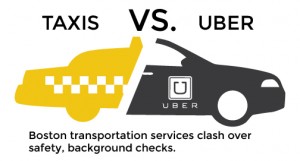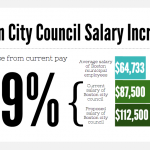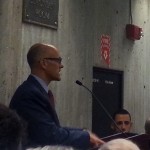
Uber, a ridesharing service widely used by Boston-area college students, debuted a bring-your-own-device program in August to streamline drivers’ ability to find customers, a move that has prompted taxicab unions and other organizations to raise safety concerns.
Uber previously issued devices to its drivers that enabled them to find fares. But as of Aug. 27, drivers with an iPhone 4S or newer model can download an app so they can pick up riders with their personal phones.
In early September, the app, which Uber intended to be available only to approved drivers, was leaked on the Internet for download by anyone with the proper device.
Boston Taxi Driver’s Association is one of several critics of Uber’s new program. Easier access to the app could enable unscreened drivers to offer rides, said Donna Blythe-Shaw, BTDA’s spokeswoman.
“It makes it less safe for the public because anybody who has their own device can sign up with Uber and then lend that device out to somebody else,” she said. “You don’t even know who’s going to be in your car now.”
Blythe-Shaw said registered Uber drivers might lend their phones to unregistered drivers in a mutually beneficial agreement.
“Just think about this. You’ve got a smartphone, somebody else can’t afford one or has a reason that they can’t get hired by Uber,” she said. “So you say, ‘OK, I’m going to lease you my phone for the day for 100 bucks. Good deal to you, right?’ And then the guy goes out and makes 200 bucks. What’s to stop somebody from doing that?”
Anti-fraud features built into Uber’s software are the solution to that problem, said Taylor Bennett, Uber spokesman.
“These comments are ridiculous and irresponsible,” Bennett said in an email. “At Uber, we pride ourselves on using state-of-the-art technology to ensure a safe ride, including a number of fraud prevention techniques and algorithms. Throughout the testing of this limited availability BYOD [Bring Your Own Device] beta, additional anti-fraud features are continually being built into the program.”
Among several safety precautions, Uber customers can see a picture on their phone of the person who should be driving, allowing them to check if the person who picks them up is a certified Uber employee.
Uber drivers subcontracting rides would both violate the law and Uber’s terms and conditions, Bennett said.
Blythe-Shaw said it is also important to question the rigor of Uber’s background checks on driver applicants.
“Uber says that all of their drivers are vetted, but we don’t know if they really are vetted, and by whom are they vetted,” she said. “We have evidence that it’s possible to circumvent that vetting or get around it. If you have a criminal record, you might still be able to get to drive for Uber.”
However, Bennett said Uber’s required background checks are more stringent than those taxis require. Ten percent of licensed Boston taxi drivers have failed Uber’s background checks, which include county, federal and multi-state checks that go back seven years, he said.
Despite criticism of Uber’s safety precautions, several Boston residents said they would continue to use the service in the name of convenience.
April Duddy, 34, of Beacon Hill, said she feels as comfortable with Uber’s safety measures as she does when using a taxi service.
“I don’t see that it’s very different. If something’s going to happen, then something’s going to happen, regardless of the different background checking,” Duddy said. “It would worry me just as much as taking a taxi service would. You just sort of anticipate that people have done the best they can as part of their business to look into that.”
Jon Bethard, 32, of Kenmore, said the potential of being paired with an unregistered driver is outweighed by the convenience and cost-savings provided by Uber.
“It probably wouldn’t concern me until I had a bad experience, where the driver took me somewhere else,” Bethard said. “Things don’t bother people until it affects them.”
Bethard said Uber appeals to him as a last resort if he is in desperate need of transportation.
“Usually, I’m using it if I’m running late or the bus is late and I’ve got to be somewhere, so it’s a good plan B for getting around,” he said. “Even knowing that there could be a chance to get an unregistered driver, if I’m running late, I’d probably use it.”
Ari Darlow, 23, of Kenmore, said the BYOD program is concerning because anyone who steals an approved Uber driver’s phone could then start picking up fares.
“I feel like if I heard about multiple instances of phony drivers, I would be afraid to use the service, but right now it’s fine,” he said. “Uber drivers would probably be even more protective of their phones now because of that.”















Uber is a disruptive business model, and therefore naturally opposed by unionized labor and tax-driven regulatory agencies. In our wonderful post-9/11 world, the fear mongering demonstrated by Blythe-Shaw and her status-quo ilk has become a reliable constant in all discussions of the emerging sharing economy.
The taxi industry raises the specter of kidnapping/robbery when talking about Uber.
The hotel industry raises the specter of fire/health safety when talking about AirBnb.
The restaurant industry raises the specter of health/disease when talking about EatWith.
The peer-to-peer economy isn’t as profitable for their centralized business models….